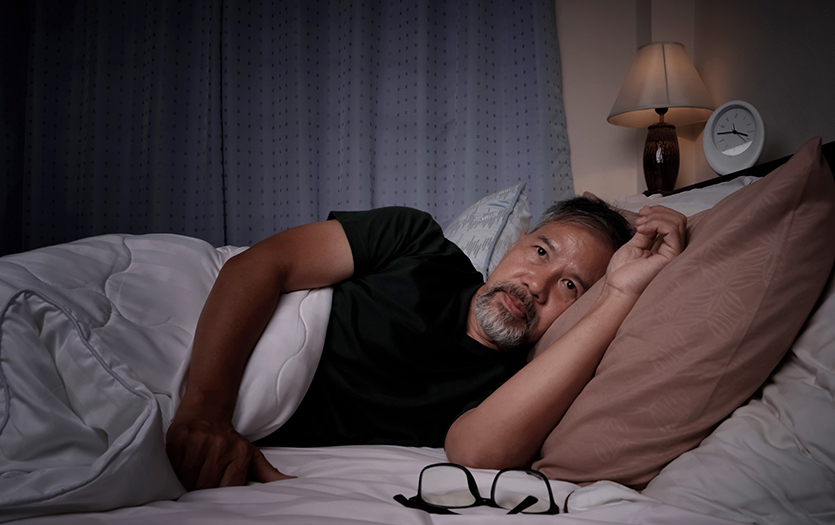
This post was written by Andrea Sloat, PharmD, BCACP, Parkview Health.
Do you spend countless hours, night after night, staring at the ceiling or scrolling social media, waiting for sleep to come? Many individuals find themselves stuck in a similar loop. In fact, nearly 40% of adults in the United States struggle to obtain adequate rest, according to the Centers for Disease Control and Prevention (CDC).
Lack of sleep can make work responsibilities and daily routines more difficult and seriously impact overall health, increasing the risk of developing chronic conditions such as heart disease, high blood pressure, obesity, diabetes and Alzheimer's disease. For those seeking a natural remedy for better sleep, melatonin may offer a path forward.
When should I consider using melatonin?
Melatonin is a hormone the body naturally produces to help control sleep and wake cycles. As daylight fades, the brain increases melatonin, signaling to the body that it is time to prepare for sleep.
Over-the-counter melatonin supplements may help improve sleep in the following situations:
-
Difficulty falling asleep - Some people are naturally "night owls" and prefer to stay up late. However, early morning responsibilities such as school and work may make it challenging to get enough sleep. Taking melatonin before the intended bedtime may help promote earlier sleep onset. For others who struggle to fall asleep regardless of the time of day, melatonin may also aid in easing the transition to sleep.
-
Jet lag -Traveling across different time zones can disrupt the body's internal clock, resulting in daytime drowsiness and difficulty sleeping at night. Taking melatonin in the evening may help adjust the sleep-wake cycle and improve daytime alertness.
-
Shift worker - Those working late, or overnight shifts may have trouble resting during time off and staying awake during working hours. Some evidence suggests that taking melatonin before bed can improve total sleep time in these individuals.
Melatonin alone may not improve shift workers' alertness during waking hours. It is likely that other strategies such as sticking to a strict sleep schedule will be needed.
Additionally, the benefits of melatonin are less clear for those who have trouble staying asleep. In these cases, alternative treatment options may be more effective.
How much melatonin should I take?
Melatonin is available in various strengths, typically ranging from 1 to 10 mg per dose. Most healthcare providers recommend starting with the lowest possible dose taken nightly. Increasing the dose by 1 mg no more than once weekly is advised until sleep improves, but it should not exceed 10 mg daily. Doses beyond this amount have not shown additional benefits. For optimal results, take melatonin approximately 30 minutes before bedtime.
Can too much melatonin be harmful?
Melatonin does not generally cause many side effects. Unlike some prescription sleep aids, it does not have a strong sedating effect, so it does not cause as much drowsiness. However, all medications and supplements carry some risk. Using the lowest effective dose can help minimize the incidence of adverse reactions such as:
-
Dizziness
-
Vivid dreams
Melatonin taken too late in the evening is more likely to cause daytime drowsiness. Refrain from driving or operating machinery within 5 hours of taking it.
In addition to these common side effects, some individuals may experience less frequent reactions, such as:
-
Mild tremor
-
Abdominal cramps
-
Irritability
-
Confusion or disorientation
In certain cases, melatonin usage may worsen more severe sleep disorders, especially at higher doses. It can also interact with several prescription drugs. Always discuss starting new supplements with your doctor or pharmacist to ensure they are safe to use alongside other medications and medical conditions.
If side effects occur or lack of sleep does not improve or worsen, consult your primary care provider. They may refer you to a sleep specialist who can evaluate your sleep disorder more closely and provide better treatment recommendations.
How long is it safe to use melatonin?
Most research has only examined the use of melatonin over relatively short timeframes. Experts generally agree it is ideal to use sleep aids at the smallest dose for the shortest amount of time, as prolonged use may increase the risk of side effects. If melatonin treatment is needed for more than a few months, it is best to discuss it with your doctor. They may want to periodically reduce the dose or stop the supplement to determine if it is still needed.
Lifestyle changes for better sleep
Sleep aids are most effective when used to overcome the initial hurdle of falling asleep, allowing time to regain practical habits. Poor sleep hygiene can easily overpower the effects of melatonin. Consider incorporating these techniques into your bedtime routine:
-
Stick to a strict sleep schedule. Consistent sleep and wake times help train the body to recognize when to start feeling tired and awake.
-
Engage in calming activities. About an hour before bed, activities such as taking a bath, reading a book or doing yoga can help the body relax and prepare for sleep.
-
Dim the lights. Illuminated screens, including TVs and phones, can suppress melatonin production or lessen its effects.
-
Reserve your bed only for sleep and intimacy. Do not use that space for work, socializing, watching TV, etc.
-
Keep the sleeping space cool. The ideal bedroom temperature is between 60-67°F.
-
Avoid large meals, alcohol and caffeine. Consuming these within 3 hours of bedtime can make it difficult to fall asleep.
-
Refrain from exercise close to bedtime. Vigorous activities can increase alertness and make it more difficult to wind down.
Final thoughts
While melatonin can be a valuable supplement for those needing help resetting their internal clock, it works best when paired with mindful practices that promote healthy sleep habits.
If you have questions about melatonin or other medications and supplements, Parkview Outpatient Pharmacies is here to help. We are committed to exceptional service and work directly with your doctor to ensure medication appropriateness and safety. Contact your preferred Parkview outpatient pharmacy, and our staff will gladly assist you with questions or prescription transfers.
Resources:



